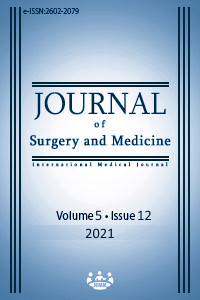Epidemiological factors associated with colorectal cancer in north-east India: A hospital-based descriptive cross-sectional study
Keywords:
Colorectal cancer, Epidemiology, Smoking, Signs, and symptoms, Lifestyle factorsAbstract
Background/Aim: Identifying the epidemiological factors associated with the causation and development of colorectal cancer may help gain a better understanding of the disease to assist in screening and assessing the prognosis. This study aimed to determine and analyze the clinical-epidemiological profile of colorectal cancer. Methods: A cross-sectional study was conducted at a tertiary teaching hospital on 138 colorectal cancer patients for 1.6 years (June 2017 to December 2018). The participants were examined clinically, and detailed history regarding demographic features, adverse habits, occupation, and family history was taken using a structured pro forma. The tumor stage and site of cancer were considered the primary outcomes. Descriptive and inferential analyses were carried out using coGuide software, V.1.03, and the P-value was set at <0.05. Results: The mean age was 54.52 (15.9) years, and 86 (62.30%) patients were males. Twenty-seven (19.60%) had hypertension, 20 (14.50%) had fissures piles and 17 (12.30%) had Diabetes Mellitus. Ninety-seven (70.28%) had a history of smoking and alcohol consumption. Carcinoma cases were more common among patients with a history of non-vegetarian dietary intake, but it was not statistically significant. In our study, smoking and comorbidities like (hypertension, fissure piles) proved to be associated with stages of tumor (P<0.05). Conclusion: The associated risk factors in our study were age >50 years, smoking, and hypertension. If controlled, these can help reduce the overall incidence of CRC in the Indian population.
Downloads
References
Gandhi AK, Kumar P, Bhandari M, Devnani B, Rath GK. The burden of preventable cancers in India: Time to strike the cancer epidemic. J Egypt Natl Canc Inst. 2017;29(1):11-8. doi: 10.1016/j.jnci.2016.08.002
Bnard F, Brkun AN, Martel M, Von Renteln D. Systematic review of colorectal cancer screening guidelines for average-risk adults: Summarizing the current global recommendations. World J Gastroenterol. 2018;24(1):124-38. doi: 10.3748/wjg.v24.i1.124
WHO. Cancer. World Health Organization [Internet].
Mannucci A, Zuppardo RA, Rosati R, Di Leo M, Perea J, Cavestro GM. Colorectal cancer screening from 45 years of age: Thesis, antithesis and synthesis. World J Gastroenterol. 2019;25(21):2565-80. doi: 10.3748/wjg.v25.i21.2565
Murphy CC. Colorectal Cancer in the Young: Does Screening Make Sense? Curr Gastroenterol Rep. 2019;21(7). doi: 10.1007/s11894-019-0695-4
Leddin D, Lieberman DA, Tse F, Barkun AN, Abou-Setta AM, Marshall JK, et al. Clinical Practice Guideline on Screening for Colorectal Cancer in Individuals With a Family History of Nonhereditary Colorectal Cancer or Adenoma: The Canadian Association of Gastroenterology Banff Consensus. Gastroenterology. 2018;155(5):1325-47. doi: 10.1053/j.gastro.2018.08.017
Rawla P, Sunkara T, Barsouk A. Epidemiology of colorectal cancer: Incidence, mortality, survival, and risk factors. Prz Gastroenterol. 2019;14(2):89-103. doi: 10.5114/pg.2018.81072
American Institute for Cancer Research. Diet, Nutrition, Physical Activity and Cancer: a Global Perspective. World Cancer Research Fund International [Internet].
Dos Santos Guedes MT, De Jesus JP, De Souza Filho O, Fontenele RM, Sousa AI. Clinical and epidemiological profile of cases of deaths from stomach cancer in the National Cancer Institute, Brazil. Ecancermedicalscience. 2014;8(1):445. doi: 10.3332/ecancer.2014.445
Sharkas GF, Arqoub KH, Khader YS, Tarawneh MR, Nimri OF, Al-zaghal MJ, et al. Colorectal Cancer in Jordan: Survival Rate and Its Related Factors. J Oncol. 2017;2017:1-6. doi: 10.1155/2017/3180762
ACS. Colorectal cancer, early detection, diagnosis, and staging. American Cancer Society [Internet].
Bhattacharya S. Colorectal Cancer: A Study of Risk Factors in a Tertiary Care Hospital of North Bengal. J Clin Diagnostic Res. 2014;8(11):FC08-10. doi: 10.7860/JCDR/2014/8844.5166
Daniel WW. Determination of sample size for estimating proportions. Biostatistics A foundation for analysis in the health sciences. 1999;8:189-90.
BDSS Corp . Released 2020. coGuide Statistics software, Version 1.0, India: BDSS corp.
Vieira AR, Abar L, Chan DSM, Vingeliene S, Polemiti E, Stevens C, et al. Foods and beverages and colorectal cancer risk: a systematic review and meta-analysis of cohort studies, an update of the evidence of the WCRF-AICR Continuous Update Project. Ann Oncol. 2017;28(8):1788-802. doi: 10.1093/annonc/mdx171
Siegel RL, Jakubowski CD, Fedewa SA, Davis A. Colorectal Cancer in the Young: Epidemiology, Prevention, Management. Am Soc Clin Oncol Educ B. 2020;40:1-14.
Wong MCS, Ching JYL, Chiu H-M, Wu KC, Rerknimitr R, Li J, et al. Risk of Colorectal Neoplasia in Individuals With Self-Reported Family History: A Prospective Colonoscopy Study from 16 Asia-Pacific Regions. Am J Gastroenterol. 2016;111(11):1621-9. doi: 10.1038/ajg.2016.52
Shin CM, Han K, Lee DH, Choi YJ, Kim N, Park YS, et al. Association Among Obesity, Metabolic Health, and the Risk for Colorectal Cancer in the General Population in Korea Using the National Health Insurance Service–National Sample Cohort. Dis Colon Rectum. 2017;60(11):1192-200. doi: 10.1097/DCR.0000000000000876
Almatroudi A. The incidence rate of colorectal cancer in Saudi Arabia: An observational descriptive epidemiological analysis. Int J Gen Med. 2020;13:977-90. doi: 10.2147/IJGM.S277272
Mafiana RN, Al Lawati AS, Waly MI, Al Farsi Y, Al Kindi M, Al Moundhri M. Association between Dietary and Lifestyle Indices and Colorectal Cancer in Oman: A Case-Control Study. Asian Pac J Cancer Prev. 2018;19(11):3117-22. doi: 10.31557/APJCP.2018.19.11.3117
Sinha R, Doval DC, Hussain S, Kumar K, Singh S, Basir SF, et al. Lifestyle and sporadic colorectal cancer in India. Asian Pacific J Cancer Prev. 2015;16(17):7683-8. doi: 10.7314/APJCP.2015.16.17.7683
Chapelle N, Martel M, Zoutendijk ET-, Barkun AN, Bardou M. Recent advances in clinical practice : colorectal cancer chemoprevention in the average- risk population. 2020;(September 1980):2244-55. doi: 10.1136/gutjnl-2020-320990
Suryadevara S, Veerendra Kumar KV, Pampanagouda SKM, Arjun R, Deshmani V, Mukherjee G. Colorectal cancer profile in a tertiary care centre, Bangalore, India. Online J Heal Allied Sci. 2014;13(1):1-4.
Yang Y, Han Z, Li X, Huang A, Shi J, Gu J. Epidemiology and risk factors of colorectal cancer in China. 2020;32(6):729-41. doi: 10.21147/j.issn.1000-9604.2020.06.06.
Downloads
- 628 549
Published
Issue
Section
How to Cite
License
Copyright (c) 2021 Zothansanga Ralte, Venu Gopala Reddy Paleti, Vimal Kumar
This work is licensed under a Creative Commons Attribution-NonCommercial-NoDerivatives 4.0 International License.
















